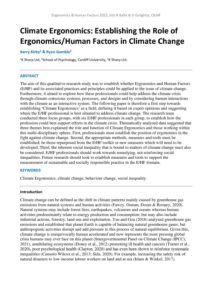| Document | Author Barry Kirby & Ryan Gamble |
| Abstract The aim of this qualitative research study was to establish whether Ergonomics and Human Factors (E/HF) and its associated practices and principles could be applied to the issue of climate change. Furthermore, it aimed to explore how these professionals could help address the climate crisis through climate-conscious systems, processes, and designs and by considering human interactions with the climate as an interactive system. The following paper is therefore a first step towards establishing ‘Climate Ergonomics’ as a field, defining it based on expert opinions and suggesting where the E/HF professional is best situated to address climate change. The research team conducted three focus groups, with six E/HF professionals in each group, to establish how the profession could best support efforts in the climate crisis. Thematically analysed data suggested that three themes best explained the role and function of Climate Ergonomics and those working within this multi-disciplinary sphere. First, professionals must establish the position of ergonomics in the fight against climate change. Second, the appropriate methods, measures and tools must be established; be those repurposed from the E/HF toolkit or new measures which will need to be developed. Third, the inherent social inequality that is bound to matters of climate change must also be considered. E/HF professionals should work towards remedying, not reinforcing social inequalities. Future research should look to establish measures and tools to support the measurement of sustainable and socially responsible practice in the E/HF domain. |

